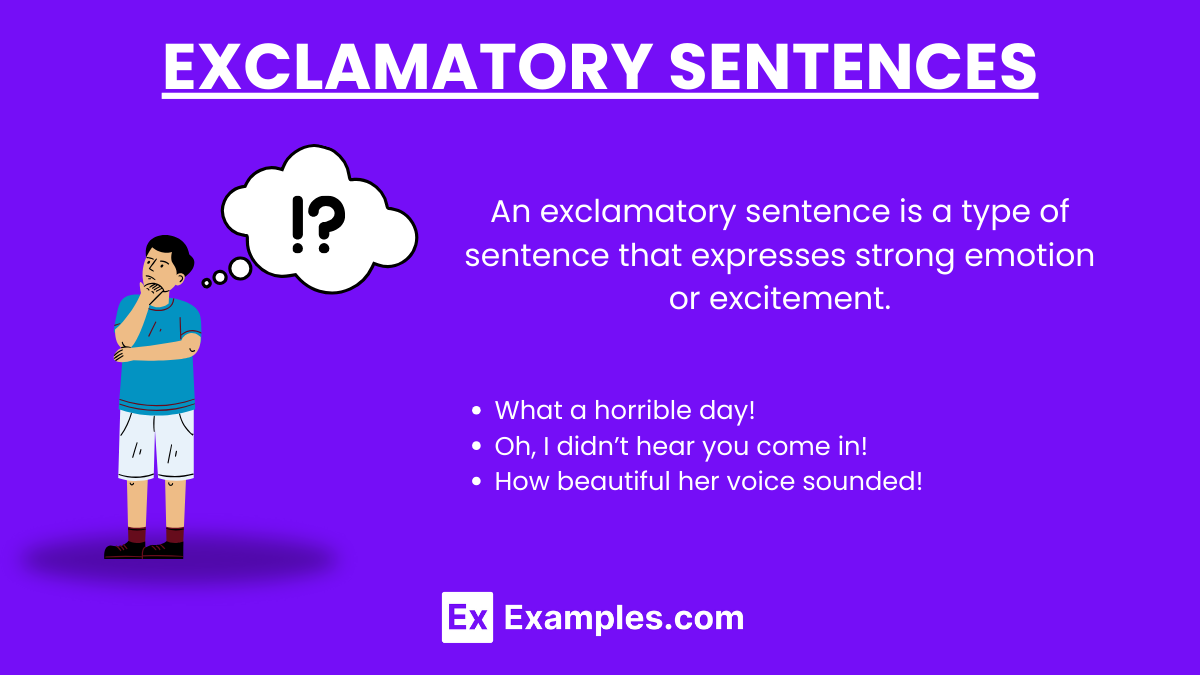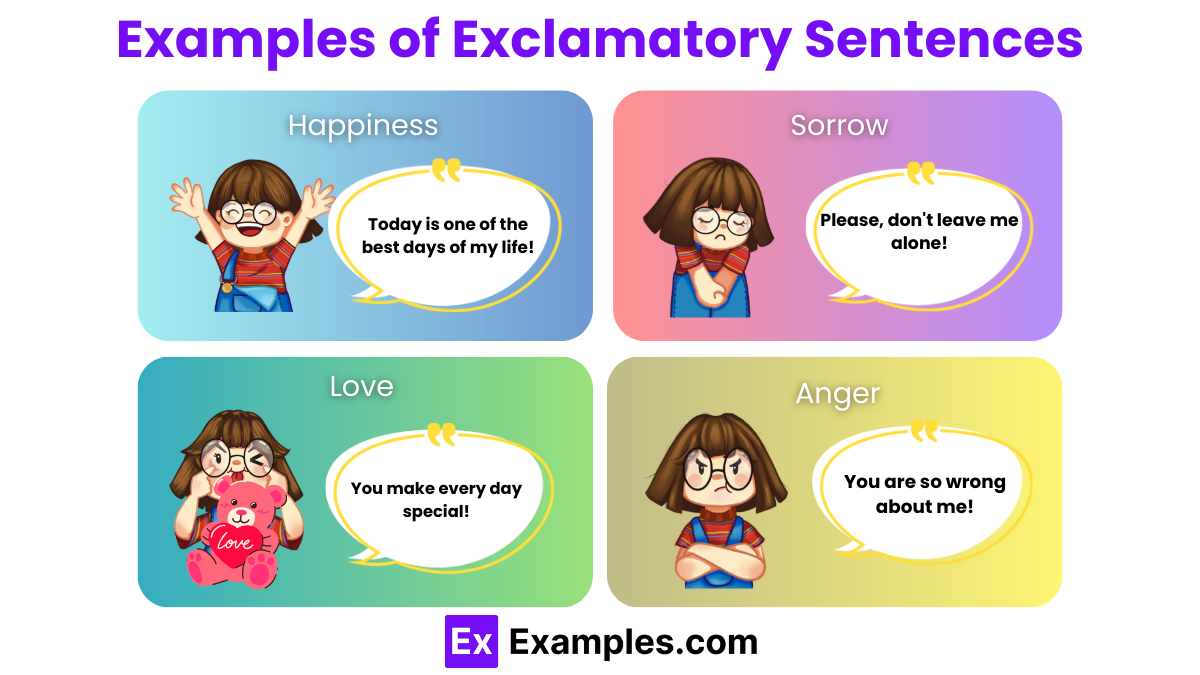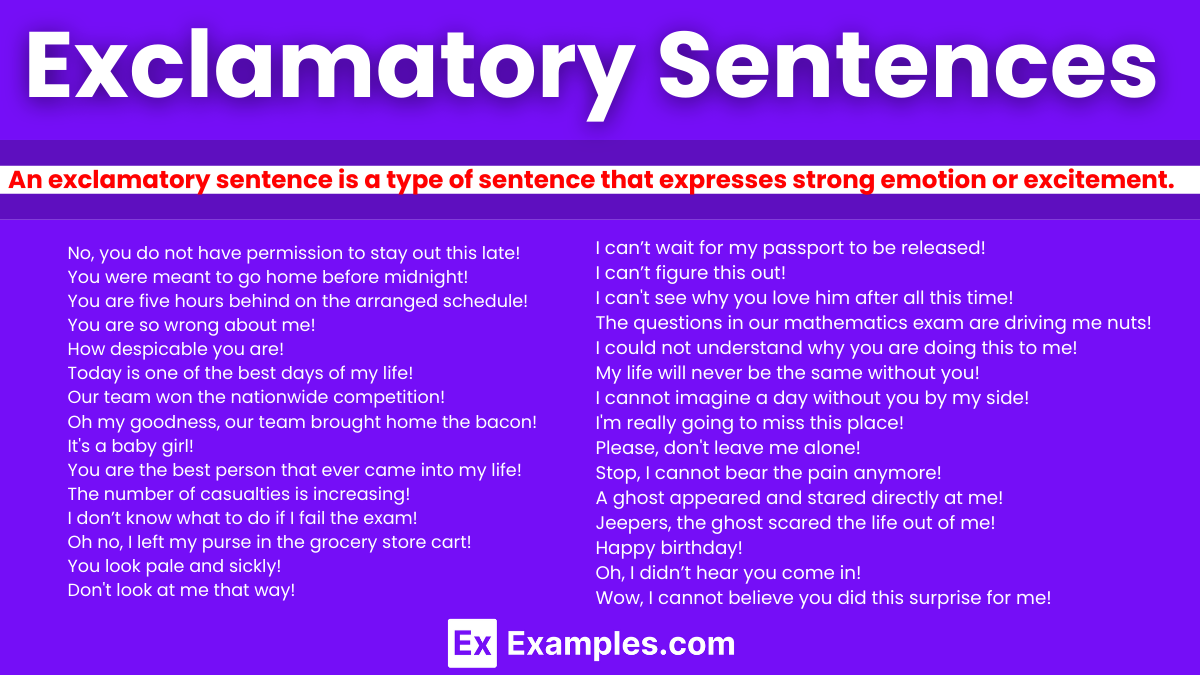30+ Exclamatory Sentence Examples
Language, both written and spoken, is a method of human communication that gives us the ability to express our emotions. However, even if it serves such noble purpose, it cannot be denied that language can get complex especially when we put into writing the emotions that are more effective when expressed through speaking.
When we try to express any form of strong emotion in written form, we cannot just write a sentence and it with a period or a question mark because it does not express our intended emotions. But no matter how complex it might be, written language has a way of expressing strong emotions and that is through the use of exclamatory sentences.
What is an Exclamatory Sentence?
An exclamatory sentence is a type of sentence that expresses strong emotion or excitement. It is easily identifiable by its use of an exclamation mark (!) at the end. Exclamatory sentences are common in both spoken and written English, used to convey surprise, happiness, shock, anger, or any other intense emotion. Unlike declarative, interrogative, and imperative sentences that serve to state facts, ask questions, or give commands, exclamatory sentences are all about the expression of strong feelings.
Characteristics of Exclamatory Sentences
- End with an exclamation mark (!): This punctuation mark is a clear indicator that the sentence is exclamatory.
- Express strong emotions: Whether it’s joy, anger, surprise, or fear, these sentences pack a punch emotionally.
- Can be structured in various ways: While they often start with “What” or “How” to emphasize, they can also be simple statements turned into exclamations with the addition of an exclamation mark.
- Used sparingly in formal writing: Due to their emotional nature, they are less common in formal or academic writing but are prevalent in creative writing and dialogue.
Structure and Punctuation of an Exclamatory Sentence
The structure and punctuation of an exclamatory sentence are crucial for conveying strong emotions effectively in writing. Understanding these elements can help writers express surprise, excitement, or any intense feeling with clarity and impact.
Punctuation of an Exclamatory Sentence
- Exclamation Mark (!): The defining feature of an exclamatory sentence is its ending with an exclamation mark. This punctuation not only indicates the end of a sentence but also emphasizes the emotional or emphatic tone of the statement.
Structure of an Exclamatory Sentence
- Basic Structure: At its simplest, an exclamatory sentence can be a declarative sentence that expresses strong emotion, punctuated with an exclamation mark. Example: “I won the lottery!”
- Starting with “What” or “How”: Many exclamatory sentences begin with “What” or “How” to add emphasis. These structures are particularly effective in highlighting the intensity or the exceptional nature of something.
“What” + (a/an) + Adjective + Noun + Subject + Verb: “What a beautiful painting this is!”.
“How” + Adjective/Adverb + Subject + Verb: “How quickly the time flies!”
- Interjections: Exclamatory sentences can also start with interjections. Interjections are words or phrases that express strong emotion or surprise (e.g., “Wow!,” “Oh!,” “Amazing!”). The interjection itself can stand as a complete exclamatory sentence or be part of a longer sentence. Example: “Wow! That’s amazing!”
Why Exclamatory Sentences are Important
Exclamatory sentences play a vital role in both spoken and written communication, providing a means to express strong emotions and add emphasis to our statements. Their importance can be understood in several key aspects:
- Expressing Strong Emotions
- Adding Emphasis
- Enhancing Narrative and Descriptive Writing
- Improving Communication Clarity
- Making Language More Dynamic
- Reflecting Spoken Language
- Highlighting Important Moments
Pronunciation of “Exclamatory Sentence”
The pronunciation of the phrase “exclamatory sentence” can be broken down into syllables to help with correct pronunciation. The emphasis is on the second syllable of “exclamatory” and the first syllable of “sentence.” Here’s a closer look:
- Exclamatory: eks-KLAM-uh-tor-ee
- /ɛksˈklæməˌtɔri/
- Sentence: SEN-tuhns
- /ˈsɛntəns/
When saying “exclamatory sentence,” the stress is on “KLAM” in “exclamatory” and “SEN” in “sentence,” ensuring the phrase flows smoothly when spoken. It’s important to note that pronunciation can slightly vary based on regional accents, but the emphasis on these syllables remains a common standard.
Points to Remember When Using Exclamatory Sentences
Exclamatory sentences are a powerful tool in both spoken and written English, capable of conveying strong emotions and emphasizing points effectively. However, to use them correctly and effectively, there are several key points to keep in mind:
- Use Sparingly: Avoid overuse to maintain their impact.
- Appropriate Context: Best suited for strong emotions; not always appropriate in formal settings.
- Emotional Impact: Consider the emotion you’re conveying and its alignment with your message.
- Punctuation: End with an exclamation mark (!) to denote emphasis and emotion.
- Avoid in Formal Writing: Use minimally in academic and professional contexts.
- Clarity and Brevity: Keep exclamatory sentences clear and concise for greater effect.
- Audience Engagement: Can be used to engage and evoke a response from the audience.
- Tone Consistency: Ensure their use is consistent with the overall tone of your content.
Examples of Exclamatory Sentences
Download This ImageHere are examples of exclamatory sentences that convey various emotions:
Anger
- No, you do not have permission to stay out this late!
- You were meant to go home before midnight!
- You are five hours behind on the arranged schedule!
- You are so wrong about me!
- How despicable you are!
Frustration
- I can’t wait for my passport to be released!
- I can’t figure this out!
- I can’t see why you love him after all this time!
- The questions in our mathematics exam are driving me nuts!
- I could not understand why you are doing this to me!
Happiness/ Elation
- Today is one of the best days of my life!
- Our team won the nationwide competition!
- Oh my goodness, our team brought home the bacon!
- It’s a baby girl!
- You are the best person that ever came into my life!
Sorrow/ Pain
- My life will never be the same without you!
- I cannot imagine a day without you by my side!
- I’m really going to miss this place!
- Please, don’t leave me alone!
- Stop, I cannot bear the pain anymore!
Surprise/ Fear
- A ghost appeared and stared directly at me!
- Jeepers, the ghost scared the life out of me!
- Happy birthday!
- Oh, I didn’t hear you come in!
- Wow, I cannot believe you did this surprise for me!
Worry
- The number of casualties is increasing!
- I don’t know what to do if I fail the exam!
- Oh no, the number of contestants are gradually decreasing!
- Oh no, I left my purse in the grocery store cart!
- You look pale and sickly!
Imperative
- Don’t look at me that way!
- Shut the door close every time you go out!
- Look out for the untamed dogs!
- Do not leave the room!
- Go away!
Difference between an exclamatory sentence and other types of sentences
| Feature | Exclamatory Sentence | Declarative Sentence | Interrogative Sentence | Imperative Sentence |
|---|---|---|---|---|
| Purpose | To express strong emotions or excitement. | To make a statement or express an idea. | To ask a question. | To give a command or make a request. |
| Punctuation | Ends with an exclamation mark (!). | Ends with a period (.). | Ends with a question mark (?). | Usually ends with a period, but can also end with an exclamation mark to denote urgency. |
| Structure | Can be varied; often begins with “What” or “How,” or can be a simple statement made emphatic with an exclamation mark. | Subject followed by a verb and completes a thought. | Starts with a helping verb or a question word (who, what, where, when, why, how). | Begins with the verb (command), and the subject (you) is often implied. |
| Tone | Emotional, emphatic. | Neutral, factual. | Inquisitive, seeking information. | Directive, requesting action. |
| Examples | “What a beautiful day!” | “It is a beautiful day.” | “Is it a beautiful day?” | “Enjoy the day.” |
Common words used in Exclamatory Sentences
Exclamatory sentences often employ specific words to amplify emotion and emphasis. Here are some common words used in exclamatory sentences, categorized by the type of emotion or emphasis they convey:
| Emotion/Emphasis | Common Words Used |
|---|---|
| Surprise or Amazement | Wow, Incredible, Unbelievable, Amazing, Astonishing |
| Happiness or Joy | Fantastic, Wonderful, Fabulous, Marvelous, Terrific |
| Sadness or Disappointment | Alas, Unfortunately, Sadly, Tragic, Heartbreaking |
| Anger or Frustration | Ridiculous, Outrageous, Unacceptable, Infuriating, Terrible |
| Encouragement or Praise | Bravo, Excellent, Well done, Superb, Magnificent |
| Affection or Fondness | Lovely, Dear, Sweet, Cherished, Adorable |
Definition According to Form
Defining exclamatory sentences according to form is the way words are arranged within an exclamatory sentence. Exclamatory sentences must begin with words “what” and “how”. Even if those two words are used in writing interrogative sentences, there’s a way that it can be used for exclamatory sentences.
Here some sentence examples:
- What sorcery!
- What a horrible day!
- How clever of your student!
- What graceful ballerinas these girls are!
- How beautiful her voice sounded!
- What a nice dress you are wearing today!
- What fools!
- How interesting the story line of the book is!
- How well she paints!
- How warm the weather is!
Also, take note of the following rules:
- Use what a or what an when using a singular noun
- Use what before a plural noun or an abstract noun.
The words so and such can also be used in exclamatory sentences.
Here are some examples:
- The view was so breathtaking!
- Your make-up is so beautiful!
- Her sense of fashion is so elegant!
- They are such mean and insensitive friends!
- She is such a well-mannered person!
Definition According to Function
Exclamatory sentences according to function is the common way of writing an exclamatory sentence. The function, or the purpose, of an exclamatory sentence is to express a strong emotion.
Other strong emotions include anger, frustration, happiness, elation, sorrow, pain, surprise, fear, worry, and a lot more.
There are also instances when the word who can be used in an exclamatory sentence since its function is to express a strong emotion. Often times, it sounds like a question is being asked, but in actuality it does not. Rather, it expresses a strong emotion and the person stating the sentence does not expect an answer.
Take this exclamatory sentence for example:
- Who do you think you are!
It is difficult to express emotions through written form if exclamatory sentences are not utilized. The sentence would sound not convey strong emotion it initially plans to intend if only a period or question mark is used.
Exclamatory Words
Aside from an exclamation mark (!), interjections or exclamatory words are also used to express strong emotions in exclamatory sentences. Some of these exclamatory words can be classified as a stand-alone simple sentence.
Here are some exclamatory words which can be classified as simple sentences:
- Amazing!
- Brilliant!
- Excellent!
- Fantastic!
- Good!
- Hey!
- Oh!
- Oh no!
- Ouch!
- Wow!
These exclamatory words can also be used to form longer exclamatory sentences.
Here are some examples:
- Amazing, he got the first prize!
- Brilliant, you actually understood what I meant!
- Excellent, you can now proceed to the next round!
- Fantastic, she won the award!
- Good, we can go home now!
- Hey, that thief has stolen your bag!
- Oh, you saw the culprit!
- Oh no, she missed the flight!
- Ouch, the dramatic scene is breaking my heart!
- Wow, it was a one-of-a-kind joy ride!
Make sure that in adding these exclamatory words, place a comma after the exclamatory word and end the sentence with an exclamation point.
However, there is a common practice of writing exclamatory sentences wherein the exclamatory word, along with the exclamation point (!) is written in the first part of the sentence, and the rest of the sentence ends with a period. This common practice is an incorrect way of writing exclamatory sentences.
Here are some examples of writing exclamatory sentences in an incorrect manner:
- Amazing! He got the first prize.
- Brilliant! You actually understood what I meant.
- Excellent! You can now proceed to the next round.
- Fantastic! She won the award.
- Good! We can go home now.
- Hey! That thief has stolen your bag.
- Oh! You saw the culprit.
- Oh no! She missed the flight.
- Ouch! The dramatic scene is breaking my heart.
- Wow! It was a one-of-a-kind joy ride.
It is a rule that when we punctuate an exclamatory sentence, the exclamation mark should be placed at the end, and not after the exclamatory word of the sentence.
Make sure you do not just sprinkle random exclamatory sentences in your written compositions because, as we all know, too much and too little of anything is bad and even unnecessary. Too much use of it might cause your reader to question the sincerity your emotion. Meanwhile, too little usage of exclamatory sentences can also make your intended emotions obscure. Thus, using the right amount and blend of exclamatory sentences will pull your readers into another dimension of your story or composition.
FAQs
How to use exclamatory sentences effectively?
Exclamatory sentences express strong emotion or surprise and are effective when used sparingly for impact. They add dramatic flair and convey excitement, anger, or astonishment, making the message more engaging and expressive.
What is an example of an exclamation point sentence?
An example of an exclamation point sentence is: “What a beautiful sunset!” This sentence uses the exclamation point to express admiration and surprise, highlighting the speaker’s strong emotional response.
What is an exclamatory sentence for kids?
An exclamatory sentence for kids often involves simple, expressive statements that convey excitement or emotion, such as: “Wow, that’s a huge ice cream cone!” It’s straightforward and relatable, showing enthusiasm.
What is the exclamatory sentence of angry?
An exclamatory sentence expressing anger might be: “I can’t believe you broke my favorite vase!” This sentence uses strong emotion to convey disappointment and frustration, emphasizing the speaker’s anger.





